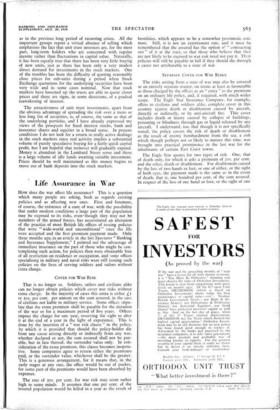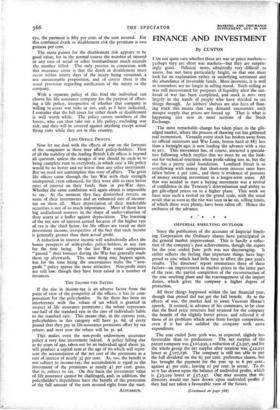Life Assurance in War
How does the war affect life assurance? This is a question which many people are asking, both as regards existing policies and as affecting new ones. First and foremost, of course, the existence of a state of war, with the possibility that under modern conditions a large part of the population may be exposed to its risks, even•though they may not be members of the armed forces, has necessitated an alteration of the practice of most British life offices of issuing policies that were "wide-world and unconditional" "once the life were accepted and the first premium payment made. Only three months ago, in an article in the last Spectator" Banking and Insurance Supplement," I pointed out the advantage of immediate insurance on the part of those who might be con- templating such action, for policies then were obtainable free of all restriction on residence or occupation, and some offices specialising in military and naval risks were still issuing such policies on the lives of serving soldiers and sailors without extra charge.
COVER FOR WAR RISK That is no longer so. Soldiers, sailors and civilians alike can no longer obtain policies which cover war risks without extra charge. In the majority of cases this extra is either Li or 21S. per cent. per annum on the sum assured, in the case of civilians not liable to military service. Some offices stipu- late that the extra premium shall be payable for the duration of the war or for a maximum period of five years. Others impose the charge for one year, reserving the right to alter it at the end of a year in the light of experience. This is done by the insertion of a "war risk clause" in the policy, by which it is provided that should the policy-holder die from any cause arising directly or indirectly from any war, whether declared or not, the sum assured shall not be pay- able, but in lieu thereof, the surrender value only. In con- sideration of the extra premium, this clause becomes inopera- tive. Some companies agree to return either the premiums paid, or the surrender value, whichever shall be the greater. This is a generous arrangement, for it means that, in the early stages at any rate, the office would be out of pocket, for some part of the premiums would have been absorbed by expenses.
The rate of 20S. per cent. for war risk may seem rather high to some minds. It assumes that one per cent. of the insured population would be killed in a year as the result of hostilities, which appears to be a somewhat pessimistic esti- mate. Still, it is not an extortionate rate, and it must be remembered that the assured has the option oF " contt acting out" of it at the start, so that those who believe that they are not likely to be exposed to war risk need not pay it. Their policies will still be payable in full if they should die through a cause not attributable to a state of war.
SEPARATE COVER FOR WAR RISKS The risks arising from a state of war may also be covered as an entirely separate matter, on terms at least as favourable as those charged by the offices as an "extra "to the premium on an ordinary life policy, and, if required, with much wider scope. The Eagle Star Insurance Company, for example, offers to civilians and soldiers alike, complete cover in this country against death or disablement caused by aircraft, directly or indirectly, or by anti-aircraft fire. This cover includes death or injury caused by collapse of buildings, poisoning or blindness through gas or liquid released by any aircraft. I understand, too, that though it is not specifically stated, the policy covers the risk of death or disablement as the result of enemy bombardment from the sea, a risk which though perhaps not so likely to mature this time, was brought into practical prominence in the last war for the inhabitants of certain East Coast towns.
The Eagle Star quote q for two types of risk. One, that of death only, for which it asks a premium of 2IS. per cent. and the other, death or disablement. For disablement caused by the loss of two hands or feet, or one of either, or the sight of both eyes, the payment made is the same as in the event of death, that is, one hundred per cent. of the sum assured. In respect of the loss of one hand or foot, or the sight of one eye, the payment is fifty per cent. of the sum assured. For this combined death or disablement risk the premium is two guineas per cent.
The extra guinea for the disablement risk appears to be good value, for in the normal course the number of injured in any case of aerial or other bombardment much exceeds the number killed. The only proviso in connexion with this insurance cover is that the death or disablement must occur within ninety days of the injury being sustained, a not unreasonable proposition and of course there is the usual provision regarding notification of the injury to the company.
With a separate policy of this kind the individual can choose his life assurance company for the purpose of effect- ing a life policy, irrespective of whether that company is willing to cover war risks or not, and, as I have indicated, I consider that the full cover for either death or disablement is well worth while. The policy covers members of the forces, who can thus take out a life policy, excluding war risk, and they will be covered against anything except actual flying risks while they are in this country.
LIFE OFFICE PROFITS Now let me deal with the effects of war on the fortunes of the companies as these may affect policy-holders. First of all the stability of the leading British Life offices is beyond all question, unless the ravages or war should be such as to bring complete ruin to everybody, in which case a life policy would be no better and no worse than any other investment. But we need not contemplate that state of affairs. The great life offices came through the last War with their strength unimpaired, even enhanced, for they were able to earn better rates of interest on their funds than in pre-War days. Whether the same conditions will again obtain is impossible to say. At the moment they face diminished returns on some of their investments and an enhanced rate of income- tax on them all. Mere depreciation of their marketable securities is not of so much importance. Most of them have big undisclosed reserves in the shape of under-valuation of their assets as a buffer against depreciation. The lowering of the net rate of interest earned because of the higher rate of tax is the chief factor, for life offices are taxed on their investment income, irrespective of the fact that such income is generally greater than their actual profit.
A reduction in interest income will undoubtedly affect the bonus prospects of with-profits policy-holders, at any rate for the time being. In the last War some companies " passed " their bonuses during the War but generally made them up afterwards. The same thing may happen again, but for the time being the uncertainties make the " non- profit " policy appear the more attractive. Non-profit rates are still low, though they have been raised in a number of instances.
THE INCOME-TAX SAVING If the rise in income-tax is an adverse factor from the point of view of the prosperity of the offices, it has its com- pensation for the policyholder. So far there has been no interference with the rebate of tax which is granted in respect of life assurance premiums ; the rebate represents one-half of the standard rate in the case of individuals liable to the standard rate. This means that, in the current year, policyholders in this category will have 3s. 6d. of every pound that they pay in life-assurance premiums offset by tax rebate, and next year the rebate will be 3s. gd.
This makes even the non-profit endowment assurance policy a very fine investment indeed. A policy falling due at 60 years of age, taken out by an individual aged about 30, will produce a capital sum at the age of 6o which will repre- sent the accumulation of the net cost of the premiums at a rate of interest of nearly 31 per cent. As, too, the benefit is not subject to income-tax, the accumulation is equal to the investment of the premiums at nearly 41 per cent. gross, that is, subject to tax. On this basis the investment value of life assurance cannot be challenged, and, in addition, the policyholder's dependants have the benefit of the protection of the full amount of the sum assured right from the start.
AcruARIus.













































 Previous page
Previous page